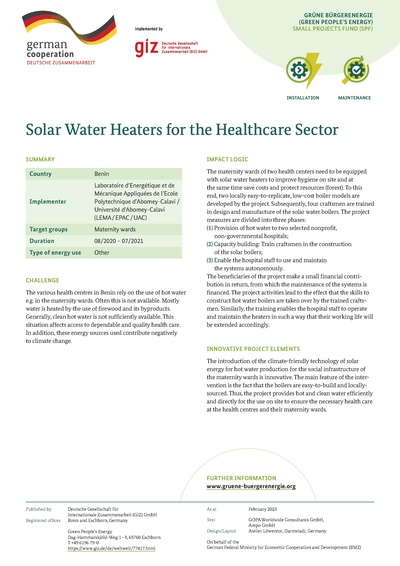Difference between revisions of "Solar Water Heaters for the Healthcare Sector"
From energypedia
***** (***** | *****) (Created page with "{{GBE ProjectDB |GBE project name=Solar Water Heaters for the Healthcare Sector |GBE organisation=Laboratoire d’Energétique et de Mécanique Appliquées de l’Ecole Pol...") |
***** (***** | *****) |
||
| (5 intermediate revisions by 2 users not shown) | |||
| Line 1: | Line 1: | ||
{{GBE ProjectDB | {{GBE ProjectDB | ||
| − | |GBE project name=Solar Water Heaters for | + | |GBE project name=Solar Water Heaters for Beninese the Healthcare Sector |
|GBE organisation=Laboratoire d’Energétique et de Mécanique Appliquées de l’Ecole Polytechnique d’Abomey-Calavi / Université d’Abomey-Calavi (LEMA/ EPAC/UAC) | |GBE organisation=Laboratoire d’Energétique et de Mécanique Appliquées de l’Ecole Polytechnique d’Abomey-Calavi / Université d’Abomey-Calavi (LEMA/ EPAC/UAC) | ||
| − | |GBE date start= | + | |GBE date start=July 2022 |
| − | |GBE date end= | + | |GBE date end=September 2023 |
| − | |GBE project description=The maternity wards of two health centers need to be equipped with solar water heaters to improve hygiene on site and at the same time save costs and protect resources (forest). To this end, two locally easy-to-replicate, low-cost boiler models are developed by the project. Subsequently, four craftsmen are trained in design and manufacture of the solar water boilers. The project measures are divided into three phases: (1) Provision of hot water to two selected | + | |GBE project description=The maternity wards of two health centers need to be equipped with solar water heaters to improve hygiene on site and at the same time save costs and protect resources (forest). To this end, two locally easy-to-replicate, low-cost boiler models are developed by the project. Subsequently, four craftsmen are trained in design and manufacture of the solar water boilers. The project measures are divided into three phases: (1) Provision of hot water to two selected non-profit, non-governmental hospitals; (2) Capacity building: Train craftsmen in the construction of the solar boilers; (3) Enable the hospital staff to use and maintain the systems autonomously. The beneficiaries of the project make a small financial contribution in return, from which the maintenance of the systems is financed. The project activities lead to the effect that the skills to construct hot water boilers are taken over by the trained craftsmen. Similarly, the training enables the hospital staff to operate and maintain the heaters in such a way that their working life will be extended accordingly. |
| + | |||
| + | |||
| + | The introduction of the climate-friendly technology of solar energy for hot water production for the social infrastructure of the maternity wards is innovative. The main feature of the intervention is the fact that the boilers are easy-to-build and locally-sourced. Thus,the project provides hot and clean water efficiently and directly for the use on site to ensure the necessary health care at the health centres and their maternity wards. | ||
|GBE financed=Small Projects Fund | |GBE financed=Small Projects Fund | ||
| − | |GBE category | + | |GBE category skills=Skills Development |
| + | |GBE category social=Social Institutions | ||
|GBE countrySPF=Benin | |GBE countrySPF=Benin | ||
|GBE locationSPF=6.51096, 2.33031 | |GBE locationSPF=6.51096, 2.33031 | ||
|GBE FS source=Wiki Upload | |GBE FS source=Wiki Upload | ||
| − | |GBE FS source Wiki= | + | |GBE FS source Wiki=GBE-SPF_LEMA_Projectfactsheet (2).pdf |
}} | }} | ||
Latest revision as of 14:54, 7 May 2024
Solar Water Heaters for Beninese the Healthcare Sector
Last edit made by Helen Mengs on 2024-05-07. This is a wiki, do not hesitate to update information by clicking on "Edit with form".
Key Data
Organisation
Laboratoire d’Energétique et de Mécanique Appliquées de l’Ecole Polytechnique d’Abomey-Calavi / Université d’Abomey-Calavi (LEMA/ EPAC/UAC)
Duration
July 2022 - September 2023
Project Description
The maternity wards of two health centers need to be equipped with solar water heaters to improve hygiene on site and at the same time save costs and protect resources (forest). To this end, two locally easy-to-replicate, low-cost boiler models are developed by the project. Subsequently, four craftsmen are trained in design and manufacture of the solar water boilers. The project measures are divided into three phases: (1) Provision of hot water to two selected non-profit, non-governmental hospitals; (2) Capacity building: Train craftsmen in the construction of the solar boilers; (3) Enable the hospital staff to use and maintain the systems autonomously. The beneficiaries of the project make a small financial contribution in return, from which the maintenance of the systems is financed. The project activities lead to the effect that the skills to construct hot water boilers are taken over by the trained craftsmen. Similarly, the training enables the hospital staff to operate and maintain the heaters in such a way that their working life will be extended accordingly.
GBE Component
Small Projects Fund
Categories
- Skills Development
- Social Institutions
Factsheet
Location
Country SPF
Benin
Geographic coordinates of project site
{{#geocode: 6.51096, 2.33031}}
Latitude Longitude




















